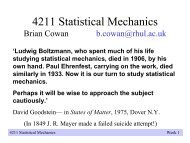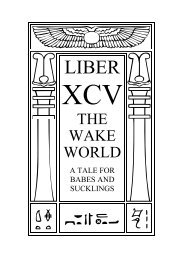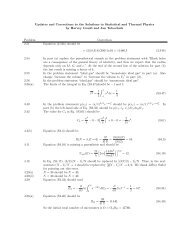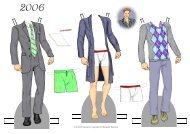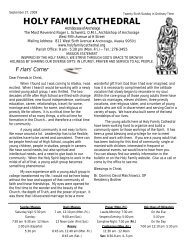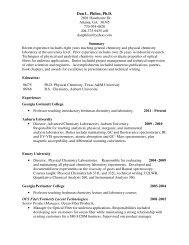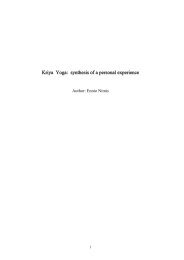A Critique of The German Ideology
A Critique of The German Ideology
A Critique of The German Ideology
You also want an ePaper? Increase the reach of your titles
YUMPU automatically turns print PDFs into web optimized ePapers that Google loves.
"forms <strong>of</strong> self-determination" on the part <strong>of</strong> the concept developing in history. It follows<br />
then naturally, too, that all the relationships <strong>of</strong> men can be derived from the concept <strong>of</strong><br />
man, man as conceived, the essence <strong>of</strong> man, Man. This has been done by the speculative<br />
philosophers. Hegel himself confesses at the end <strong>of</strong> the Geschichtsphilosophie that he<br />
"has considered the progress <strong>of</strong> the concept only" and has represented in history the "true<br />
theodicy". (p.446.) Now one can go back again to the producers <strong>of</strong> the "concept", to the<br />
theorists, ideologists and philosophers, and one comes then to the conclusion that the<br />
philosophers, the thinkers as such, have at all times been dominant in history: a<br />
conclusion, as we see, already expressed by Hegel. <strong>The</strong> whole trick <strong>of</strong> proving the<br />
hegemony <strong>of</strong> the spirit in history (hierarchy Stirner calls it) is thus confirmed to the<br />
following three efforts.<br />
No. 1. One must separate the ideas <strong>of</strong> those ruling for empirical reasons, under empirical<br />
conditions and as empirical individuals, from these actual rulers, and thus recognise the<br />
rule <strong>of</strong> ideas or illusions in history.<br />
No. 2. One must bring an order into this rule <strong>of</strong> ideas, prove a mystical connection among<br />
the successive ruling ideas, which is managed by understanding them as "acts <strong>of</strong><br />
self-determination on the part <strong>of</strong> the concept" (this is possible because by virtue <strong>of</strong> their<br />
empirical basis these ideas are really connected with one another and because, conceived<br />
as mere ideas, they become self-distinctions, distinctions made by thought).<br />
No. 3. To remove the mystical appearance <strong>of</strong> this "self-determining concept" it is<br />
changed into a person -- "Self-Consciousness" -- or, to appear thoroughly materialistic,<br />
into a series <strong>of</strong> persons, who represent the "concept" in history, into the "thinkers", the<br />
"philosophers", the ideologists, who again are understood as the manufacturers <strong>of</strong> history,<br />
as the "council <strong>of</strong> guardians", as the rulers. Thus the whole body <strong>of</strong> materialistic elements<br />
has been removed from history and now full rein can be given to the speculative steed.<br />
Whilst in ordinary life every shopkeeper is very well able to distinguish between what<br />
somebody pr<strong>of</strong>esses to be and what he really is, our historians have not yet won even this<br />
trivial insight. <strong>The</strong>y take every epoch at its word and believe that everything it says and<br />
imagines about itself is true.<br />
This historical method which reigned in <strong>German</strong>y, and especially the reason why, must<br />
be understood from its connection with the illusion <strong>of</strong> ideologists in general, e.g. the<br />
illusions <strong>of</strong> the jurist, politicians (<strong>of</strong> the practical statesmen among them, too), from the<br />
dogmatic dreamings and distortions <strong>of</strong> these fellows; this is explained perfectly easily<br />
from their practical position in life, their job, and the division <strong>of</strong> labour.



